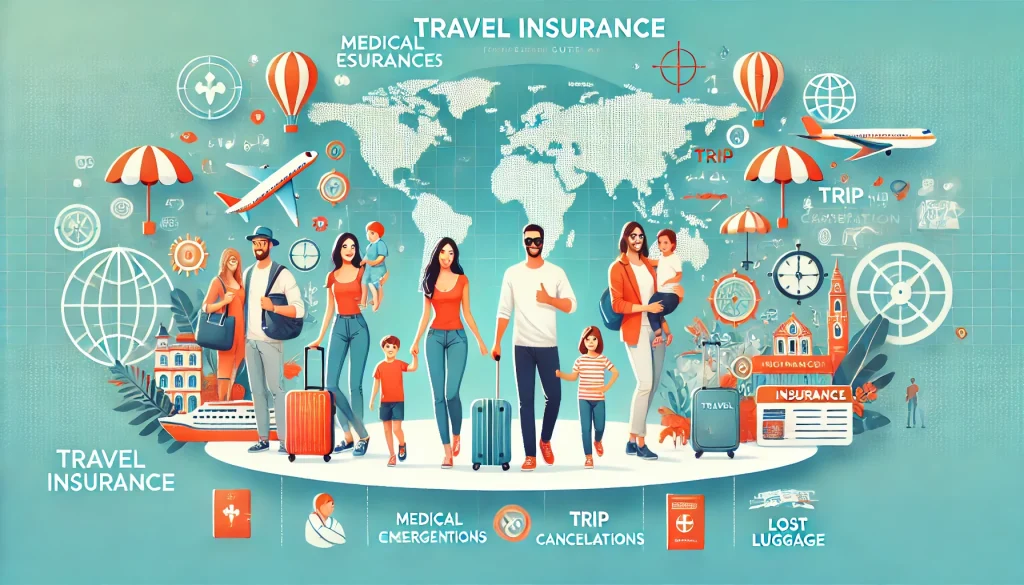
Travel Insurance
Traveling is one of life’s greatest joys, but it can come with uncertainties. Whether you’re embarking on a short trip or a long adventure, having the right travel insurance can provide peace of mind and protection against unforeseen events. In this article, we will delve into the essentials of travel insurance, what it covers, why it’s important, and how to choose the best policy for your needs.
What is Travel Insurance?
Travel insurance is a type of insurance designed to cover various unexpected events that may occur during your trip. This can include trip cancellations, medical emergencies, lost luggage, and other unforeseen incidents. By purchasing travel insurance, you are essentially safeguarding your financial investment in your trip, ensuring that you are covered in case things don’t go as planned.
Types of Travel Insurance Coverage
When it comes to travel insurance, several types of coverage are available, each tailored to different needs:
1. Trip Cancellation Insurance
This coverage reimburses you for non-refundable expenses if you have to cancel your trip due to specific reasons, such as illness, a family emergency, or other unforeseen events. This can protect you from losing significant amounts of money on flights, accommodations, and other bookings.
2. Medical Insurance
Travel medical insurance covers emergency medical expenses that may arise during your trip. This is particularly important when traveling abroad, as your domestic health insurance may not provide coverage in foreign countries. It can include hospital stays, medical treatments, and emergency evacuation.
3. Baggage Loss or Delay Insurance
This coverage provides compensation for lost, stolen, or damaged luggage. It can also cover expenses for essential items if your baggage is delayed, ensuring you can purchase necessary clothing and toiletries while you wait for your luggage to arrive.
4. Emergency Evacuation Insurance
In the event of a serious medical emergency requiring transportation to a medical facility, emergency evacuation insurance covers the costs of transportation. This is crucial for travelers heading to remote areas where access to healthcare facilities may be limited.
5. Travel Interruption Insurance
This type of coverage is similar to trip cancellation insurance but focuses on reimbursing you for expenses incurred if your trip is interrupted after it has begun. This could be due to unexpected events like natural disasters or serious illnesses.
Why You Need Travel Insurance
1. Protection Against Financial Loss
Traveling involves considerable financial investment. From flights and accommodations to activities and tours, unexpected events can lead to significant financial losses. Travel insurance protects your investment, ensuring that you can recover costs in case of cancellations or emergencies.
2. Peace of Mind
Knowing you have insurance coverage allows you to travel with peace of mind. You can enjoy your trip without constantly worrying about potential mishaps, knowing you are protected against uncertainties.
3. Access to Emergency Services
Many travel insurance policies provide access to 24/7 emergency assistance services. This means you can get help and advice when you need it most, whether it’s locating a nearby medical facility or arranging emergency transportation.
4. Coverage for Pre-existing Conditions
Some travel insurance policies offer coverage for pre-existing medical conditions. If you have a chronic illness, it’s crucial to find a policy that includes this coverage, as it can protect you from high medical expenses abroad.
How to Choose the Right Travel Insurance Policy
1. Assess Your Needs
Evaluate your travel plans and specific needs. Consider factors like your destination, the length of your trip, and any activities you plan to participate in. Understanding your unique circumstances will help you choose the right coverage.
2. Compare Policies
Take the time to compare different travel insurance policies from various providers. Look for coverage limits, exclusions, and the costs associated with each plan. Online comparison tools can make this process easier.
3. Read the Fine Print
Before purchasing a policy, carefully read the terms and conditions. Pay attention to coverage limits, exclusions, and claims processes. Understanding what is and isn’t covered will help avoid surprises later.
4. Check for Reviews and Ratings
Research the insurance provider’s reputation by checking reviews and ratings. Look for feedback on their customer service, claims process, and overall reliability. A reputable provider will have positive reviews and a strong track record of customer satisfaction.
5. Consider the Cost
While cost shouldn’t be the only factor in your decision, it is essential to find a policy that fits your budget. Look for a balance between adequate coverage and affordability.
Conclusion
Travel insurance is an essential component of any travel plan, providing financial protection and peace of mind against unexpected events. By understanding the different types of coverage available and how to choose the right policy, you can ensure that your travel experience is as enjoyable and stress-free as possible. As you prepare for your next adventure, consider investing in travel insurance to safeguard your journey.






